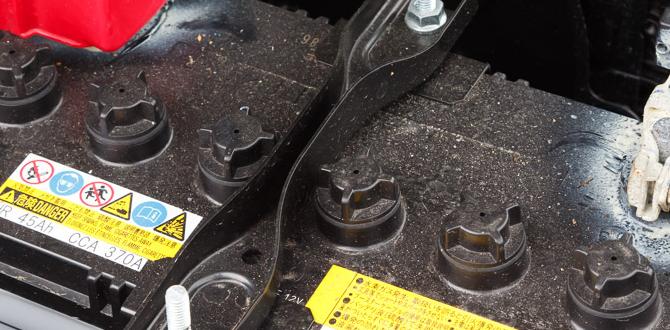Synonyms for Battery: Essential Power Words Revealed
Discovering the right words for ‘battery’ unlocks clearer communication about power sources. From your car’s engine starter to your phone’s lifeline, understanding these synonyms helps you explain, troubleshoot, and purchase the right power supply with confidence. Let’s explore the essential power words!
Ever felt a bit stuck trying to describe that essential power source in your car, phone, or even a wireless tool? You’re not alone! Sometimes, the word “battery” just doesn’t quite fit, or you need a clearer way to talk about its function. Whether you’re discussing your car sputtering to life or your phone dying unexpectedly, having a good vocabulary for power sources can save you time, confusion, and maybe even money. Think of it like having the right tool for the job – the right word makes all the difference. We’re here to break down all the different ways we talk about batteries, so you can have confident conversations and make smart choices about your power needs. Get ready to power up your vocabulary!
Why Different Words Matter for “Battery”
Talking about batteries can sometimes feel like a maze. We use the word “battery” for so many different things, from the big, heavy one in your car to the small, slender one in your TV remote. Each has its own job and its own quirks. Using the right word helps everyone understand what you’re talking about, especially when you’re asking for help or buying a replacement. Imagine asking for “a strong power thingy for my car”—not very helpful, right? But if you ask for a specific type of car battery, you’ll get exactly what you need. In the world of tech and cars, precision matters. It ensures safety, proper function, and avoids costly mistakes. Let’s dive into the many faces of batteries and the words we use to describe them.
Common Synonyms for Battery and Their Meanings
When we talk about batteries, we’re often referring to a device that stores electrical energy and then releases it to power something. But depending on the context, different words can be more accurate and informative. Knowing these synonyms helps you communicate precisely and understand technical details better.
1. Power Source / Energy Source
This is a very general term. Think of it as the umbrella word for anything that supplies power. It’s useful when you’re talking broadly about where electricity comes from for a device.
- When to use it: When discussing the overall system providing energy, without getting specific about the battery type.
- Example: “We need to check the vehicle’s primary power source to ensure it starts reliably.”
2. Energy Cell / Cell
This term often refers to a single unit within a larger battery pack. Many batteries, like those in your phone or laptop, are made up of multiple “cells” connected together. It’s a more technical term but good to know.
- When to use it: When discussing the individual components that make up a battery or when referring to a single, self-contained power unit.
- Example: “Each energy cell in this battery pack has a rated voltage of 3.7 volts.”
3. Power Pack / Battery Pack
This is a common term for a collection of battery cells assembled together in a housing. You’ll hear this a lot for devices like laptops, power tools, and electric vehicles.
- When to use it: When you’re referring to a larger, integrated unit of multiple cells.
- Example: “The laptop’s power pack needs to be replaced after five years of use.”
4. Accumulator
This is a more formal and older term, often used in engineering or scientific contexts. It refers to a device that accumulates and stores energy, usually electrical. You might see this in older technical manuals or in discussions about rechargeable batteries.
- When to use it: In technical or historical discussions about rechargeable energy storage.
- Example: “Lead-acid accumulators have been the standard for automotive starting for decades.”
5. Rechargeable Battery / Recharger
This is a specific type of battery designed to be used multiple times. It can be recharged using an external power source. While “recharger” is often confused with “charger,” ‘rechargeable battery’ is a direct synonym for a specific type of battery.
- When to use it: When you need to emphasize that the battery can be powered up again and again.
- Example: “My flashlight uses standard AA rechargeable batteries, which saves me money on disposables.”
6. Non-rechargeable Battery / Disposable Battery
These are batteries meant to be used until their power is depleted and then discarded. Think of standard alkaline batteries you might find in a remote control.
- When to use it: To distinguish from rechargeable types, often for convenience or specific single-use applications.
- Example: “For the smoke detector, always use these high-quality non-rechargeable batteries for maximum lifespan.”
7. Car Battery / Automotive Battery
This is very specific and refers to the battery used in vehicles to start the engine and power the electrical systems when the engine isn’t running. It’s usually a large, lead-acid type.
- When to use it: Specifically for vehicles.
- Example: “I think I need a new car battery; it’s making a clicking sound when I try to start it.”
8. Phone Battery / Mobile Battery
Self-explanatory, this refers to the power source for your smartphone or mobile device. These are typically lithium-ion or lithium-polymer types and are often integrated into the device.
- When to use it: When discussing the power source of a portable communication device.
- Example: “My old smartphone’s phone battery doesn’t hold a charge for very long anymore.”
9. Power Bank / Portable Charger
While technically a device containing a battery, these are commonly referred to by these terms. They are external power sources used to charge other devices on the go.
- When to use it: For external, portable charging devices.
- Example: “I always carry a power bank when I travel so I can keep my phone charged.”
Synonyms in Common Scenarios
Understanding these synonyms becomes a lot easier when we see them in action. Let’s look at a few everyday situations where choosing the right word can make a difference.
Scenario 1: Your Car Won’t Start
You turn the key, and all you hear is a click, or nothing at all. Here’s how synonyms can help you explain the problem:
- You might say: “My car isn’t starting. I suspect the automotive battery might be dead.”
- Or, if you’re talking to a mechanic: “The engine isn’t turning over; it seems like a failure in the starter battery.”
- If it’s a cold day and the battery is older: “The low temperature really drained the car’s power cell.”
Scenario 2: Your Phone Dies Quickly
You’re out and about, and your phone’s battery icon turns red faster than usual. What’s going on?
- You might complain to a friend: “This old phone battery is terrible; it only lasts a few hours!”
- If you’re looking to buy a replacement: “I need to find a compatible mobile battery for my model.”
- When troubleshooting with tech support: “I think the integrated energy cell in my device is degrading.”
Scenario 3: Your Wireless Mouse Stops Working
Suddenly, your computer mouse is unresponsive. It’s likely a small battery.
- You might say: “My mouse isn’t moving the cursor. The disposable batteries probably died.”
- Or, if you use rechargeable ones: “I need to swap out the rechargeable cells in the mouse.”
- Referring to the general need: “It needs a new power source; I’ll grab some new AAA batteries.”
Choosing the Right Battery: A Practical Guide
When you need to buy a new battery, knowing what to ask for is crucial. The wrong battery can be ineffective, damage your device, or be a safety hazard. Let’s break down how to choose correctly.
For Your Car
Car batteries are specialized. They need to provide a huge burst of power to crank the engine, hence the term “starter battery.” They also have a specific size and terminal type to fit your car. Always check your car’s manual or look up your car’s make and model online to find the right specifications. Reputable auto parts stores, like Parts.com, offer tools to find compatible batteries by vehicle information.
Key Car Battery Features to Check:
- Group Size: This refers to the physical dimensions and terminal placement.
- Cold Cranking Amps (CCA): How much power it can deliver in freezing temperatures. Higher is generally better in colder climates.
- Reserve Capacity (RC): How long the battery can run essential accessories if the alternator fails.
- Terminal Type: Top post, side post, etc.
For Your Phone or Tablet
Most modern smartphones and tablets use lithium-ion (Li-ion) or lithium-polymer (Li-Po) batteries. These are rechargeable and have a high energy density. Replacing these can sometimes be tricky as they are often integrated.
- Integrated: Many newer devices have batteries glued in. Professional replacement is often required.
- Removable: Older phones or some rugged devices might have batteries you can easily swap out.
- Third-Party: When buying a replacement, ensure it’s from a reputable brand and specifically made for your device model. Websites like iFixit provide guides and parts for many devices, highlighting the importance of correct specifications.
Safety Note: Lithium-ion batteries can be dangerous if punctured or mishandled. Always follow manufacturer instructions or seek professional help for replacement.
For Power Banks and Other Gadgets
Power banks, wireless earbuds, laptops, and many other portable electronics use rechargeable battery packs. When buying a replacement or a new power bank, consider:
- Capacity (mAh): Milliampere-hours measure how much energy the battery can store. Higher mAh means more charging power.
- Output Ports: Does it have USB-A, USB-C? Does it support fast charging?
- Input Port: How do you charge the power bank itself? USB-C is common now.
- Brand Reliability: Stick with well-known brands for safety and performance.
Understanding Battery Technology Beyond the Name
The words we use often hint at the underlying technology. Here’s a quick look at some common battery types you might encounter, even if they aren’t direct synonyms for “battery” but describe its nature:
| Battery Type | Common Uses | Key Feature |
|---|---|---|
| Lead-Acid | Cars, backup power systems | High starting power, reliable, heavy |
| Lithium-ion (Li-ion) | Phones, laptops, EVs, power tools | High energy density, rechargeable, lighter |
| Lithium Polymer (Li-Po) | Tablets, drones, thin electronics | Flexible shape, very thin, rechargeable |
| Nickel-Metal Hydride (NiMH) | Rechargeable AA/AAA batteries, older hybrid cars | Good capacity, more environmentally friendly than NiCd |
| Alkaline | Remote controls, flashlights, toys | Disposable, long shelf life, inexpensive |
Knowing these types helps you understand why a car battery is different from your phone battery, even though both are technically “batteries.” For instance, the high CCA of a lead-acid battery is crucial for starting a cold engine, something a Li-ion battery in your phone isn’t designed to do. Understanding these differences, even at a basic level, is part of mastering your power needs.
Battery Safety: A Top Priority
No matter what you call it – a battery, power cell, or energy accumulator – safety is paramount. Batteries store a lot of energy, and mishandling them can lead to spills, fires, or even explosions.
Here are some universal safety tips:
- Read the Manual: Always follow the manufacturer’s instructions for your specific device and battery.
- Correct Replacement: Use only the type and size of battery recommended for your device.
- Avoid Damage: Do not puncture, crush, or disassemble batteries. This is especially critical for lithium-ion types.
- Temperature Extremes: Avoid exposing batteries to extreme heat or cold, as this can degrade performance and be dangerous.
- Proper Charging: Use the correct charger. Using an incompatible charger can overcharge and damage the battery, or worse, create a fire hazard. For car batteries, ensure the charger is designed specifically for them. You can find certified chargers and charging guidelines from organizations like the Energy Star program for home systems.
- Storage: Store batteries in a cool, dry place, away from flammable materials. If storing for a long time, a partial charge is often recommended for rechargeable types.
- Disposal: Never throw batteries in the regular trash. Many types contain hazardous materials. Find a local battery recycling center; most electronics stores and auto parts stores offer recycling services. The Environmental Protection Agency (EPA) has resources on recycling common materials that include battery guidance.
By treating batteries with care and understanding their power, you ensure they work reliably and safely for you.
Frequently Asked Questions (FAQ)
Q1: What’s the main difference between a car battery and a phone battery?
A1: A car battery is designed for a high, short burst of power to start an engine and is typically lead-acid. A phone battery is designed for long-term, low-power use, is rechargeable, and usually lithium-ion/polymer. They serve very different purposes and use different technologies.
Q2: Can I use a “power pack” synonym for my laptop battery?
A2: Yes, “power pack” is a very common and accurate synonym for a laptop battery, as it’s a collection of cells in a single unit.
Q3: If my car battery is dead, can I use a power bank to start it?
A3: No. Standard power banks do not have enough power (CCA) to crank a car engine. You need a specialized car jump starter or a working car battery to jump-start.
Q4: What does “mAh” mean on a power bank?
A4: mAh stands for milliampere-hour. It’s a unit that measures battery capacity – how much energy it can store. A higher mAh number means the power bank can charge your devices more times or charge larger devices.
Q5: Are all rechargeable batteries the same?
A5: No. While they all can be recharged, there are different types like Lithium-ion, NiMH, and NiCd, each with different characteristics, lifespans, and applications.
Q6: Is it okay to leave my phone plugged in overnight with a rechargeable battery?
A6: Modern smartphones have smart charging systems that prevent overcharging. Once the battery reaches 100%, the device will stop drawing significant power. So, for most modern devices, it’s generally considered safe, though some prefer to unplug after it’s fully charged.
Q7: What is the best way to dispose of an old car battery?
A7: Never put car batteries in the regular trash. They contain hazardous materials like lead and sulfuric acid. The best way is to take them to an auto parts store, a service station, or a designated recycling center, as most places that sell car batteries will also accept old ones for recycling.
Conclusion: Powering Your Understanding
We’ve journeyed through the vibrant world of battery synonyms, from the general “power source” to the specific “automotive battery.” Understanding these terms isn’t just about knowing more words; it’s about gaining clarity, ensuring safety, and making informed decisions about the



